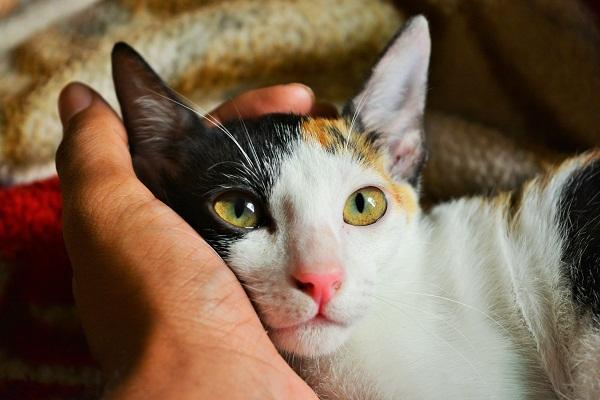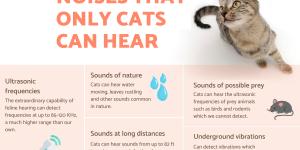Can Cats Sense Our Emotions?



See files for Cats
Many people see cats as having spiritual, mystical or even magical capacities. While there is no empirical evidence to confirm such abilities, we can see the bonds they forge with humans are special. Some people think the relationship people have with their cats is one-sided. They think cats don't care about their human guardians and have no interest in their lives. This is far from the truth. The reality is that cans perceive much more than we think.
At AnimalWised, we ask can cats sense our emotions? By looking at how cats perceive us, we will see the emotional sensitivity of cats is much higher than many people think.
Can cats sense our mood?
Absolutely cats can sense our mood. Our cats will spend large parts of their day analyzing us, reacting against our emotions and changing their behavior according to how we feel in the moment. Cats not only perceive our moods, but they are affected by them.
Such emotional sensitivity makes sense when we consider our relationship to cats. For cats, we are their main point of reference. We care for them practically, but we also provide them with their security in the form of love and affection. Our wellness translates to their wellness, so it is in their self interest to be considerate of our state of being.
Feline emotional sensitivity has been proven through studies on the relationship between cats and humans. An example is research carried out by the University of Nottingham Trent and the University of Lincoln. In this study, researchers surveyed more than 3,000 cat guardians in Great Britain who answered a series of questions related to behavior, activity, routines and health of the cats with whom they lived. They compared the data with the lifestyle, personality and mood of their caregivers to see whether or not they had an impact on the cat.
Another study carried out at the Oakland University, Michigan by researchers Jennifer Vonk and Moriah Galvan stated that our cats show. empathy. Despite what is commonly thought, they are capable of recognizing and perceiving human emotions and even do something about it.
Experts in experimental, cognitive and behavioral psychology reached these conclusions by conducting a series of tests on cats with their caregivers. They compared these with studies on these same cats interacting with strangers. They were subjected to different emotional gestures, first with visual and body language and then with audio communication.
For this reason, when your cat notices you are sick or you are crying, they often approach you to give you their support. How much they do so will depend on the individual personality of the cat. If we are happy, cats will often raise their tail next to you and seek affection. If we are angry, they will stay away. If we are stressed, it is even possible to impart stress to them.

Do cats know we love them?
Cats not only register our affection, they seek it out. Most cats will not display much affection to strangers, but they will be loving with their guardians once a bond is established. It can be difficult for some cats to develop a bond of trust, especially if they have been poorly socialized or have traumas from the past. However, with perseverance, patience and love, it it is possible to stop a cat becoming fearful around us.
To know if a cat loves us, we need to look at their behavior. They do not show affection in the same way as we do, but if we know what to look for we can recognize it when we see it. The following are the main signs and behaviors which indicate a cat loves us:
- Greets you when you arrive home
- Sleeps beside you (since they are vulnerable when asleep this shows trust)
- Seeks your attention and asks for affection
- Squint their eyes when paying attention to you
- Purring when you pet them
- Shows you their belly
- Enjoys playing with you
- Kneads you with their paws
Some of these behaviors reveal more than affection towards us. To learn more take a look at our articles on why cats show their belly to you and why cats knead you.
Can cats tell if we are sick?
Cats do not detect diseases in themselves, but they are capable of perceiving small changes in our bodies. Although they may be imperceptible to us, certain health problems produce molecules which cats can sense using their advanced olfactory ability. For example, when we have diabetes our breath will alter according to the sugar levels in our blood. Cats can detect it due to their acute sense of smell.
Additionally, cats perceive behavioral changes in their caregivers. Just as we look for signs a cat is sick, cats can tell if we are lethargic, withdrawn, weak or showing other signs of illness. They sometimes notice them before we do. They can also detect changes in our body temperature, meaning they can sense fever. Cats can tell we are sick and they may adapt their behavior accordingly.

Can cats detect death?
Although it sounds macabre, it may be possible cats can predict whether someone is dying. This thinking comes from a story published in the New England Journal of Medicine in 2007 about a cat named Oscar. He lived in a sanatorium and stayed in the rooms of people who were about to die. Once they died, he would lick them and then leave. He would even meow in refusal if he was removed from rooms of dying persons.
The explanation for this behavior is also attributed to the heightened sense of smell in cats. They can detect the smell of ketones, atoms which organisms produce when they are about to die. However, it is also important to note that others claim Oscars behavior was due to the fact he was reproducing a behavior which he learned from workers who were caring for the sick in their last moments.
If you want to read similar articles to Can Cats Sense Our Emotions?, we recommend you visit our Facts about the animal kingdom category.
- Galvan, M., & Vonk, J. (2016). Man’s other best friend: domestic cats (F. silvestris catus) and their discrimination of human emotion cues. Anim Cogn, 19, 193–205.






